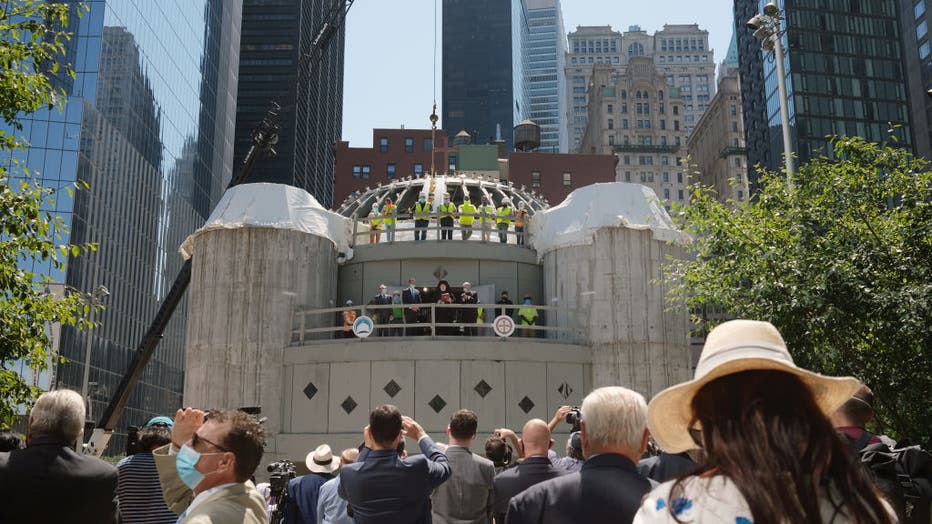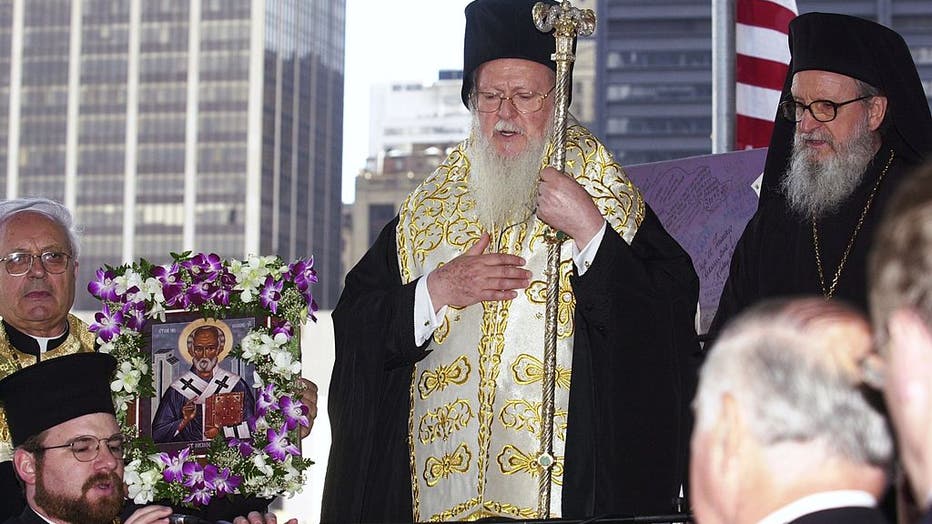Greek Orthodox church destroyed on 9/11 reopens

Greek Orthodox church reopens after being destroyed on 9/11
Two decades after the September 11 terrorist attacks, the St. Nicholas Greek Orthodox Church, which was leveled when the south tower fell, has been reopened. FOX 5 NY goes inside for a closer look.
NEW YORK - More than two decades after a tiny Greek Orthodox church in Lower Manhattan was destroyed by the falling south tower of the World Trade Center, that church's far grander replacement opened to the public this week in an elevated park overlooking the rebuilt trade center's memorial plaza.
The new St. Nicholas Greek Orthodox Church and National Shrine hosted its first liturgy service on Tuesday to mark the Feast of St. Nicholas and is preparing to welcome visitors of all faiths who want to remember the victims of the Sept. 11, 2001 terrorist attacks.
"Today is a joyous day for America and for New York," said Michael Psaros, chair of Friends of St. Nicholas, the group tasked with raising funds for the church. "We invite all of America to please come visit, to come to the cenotaph that was created and built in memory of 3,000 people who were martyred and murdered on Sept. 11."
"Even though we live in a modern age and we are modern people, I feel that we still need to be able to escape from the noise of the world and find some peace and solace in the beauty of religious faith," said Father Andreas Vithoulkas, the church's presiding priest.
Completion of the project, one of the last pieces of the newly built World Trade Center complex, once seemed in doubt.

People attend a ceremony with New York Governor Andrew Cuomo and his Eminence Archbishop Elpidophoros of America for the resumption of construction on the new Saint Nicholas Greek Orthodox Church and National Shrine at the World Trade Center on Augus
The Greek Orthodox Archdiocese of America and the Port Authority of New York and New Jersey, which owns the World Trade Center, battled in court over where the new church would be built before agreeing to Liberty Park just south of the main trade center site.
A ceremonial groundbreaking was held in 2014, but construction came to a halt in 2017 when the archdiocese fell behind on payments.
Work resumed in 2020 with the goal of opening St. Nicholas in time for the 20th anniversary of the terrorist attacks on Sept. 11, 2021. That goal was not quite met, though the church was ceremonially lighted to mark the anniversary last year.
But on Tuesday, icons depicting heroes of Sept. 11 as well as Christ and the saints watched over a service conducted largely in New Testament Greek.

The Ecumenical Patriarch Bartholomew (center), spiritual leader of Orthodox Christians, and Archbishop Demetrios, the head of the Greek Orthodox Archdiocese of America, celebrate Mass as they hold a memorial service at the site of the destroyed World
"This is the resurrection of St. Nicholas Church," said Olga Pavlakos, the vice president of the parish council and a third-generation member of the St. Nicholas community.
Another worshipper from a family that attended the old St. Nicholas, Maria Yatrakis, said she had tears in her eyes when she went inside the new church. "To see it back up like this, to see it so close to the Statue of Liberty, which represents all the immigrants who helped make this church, is very moving to all of us," Yatrakis said.
The church where Greek immigrants gathered a century ago was a converted tavern that was eventually dwarfed by the office buildings that grew around it. The new church was designed by Spanish-born architect Santiago Calatrava in the style of historic Byzantine structures including the Hagia Sophia in Istanbul, with a central dome flanked by towers.
The church is covered in marble from the same Pentelic vein in Greece where the Parthenon's stones were quarried, and at night its dome, through the translucent marble panels, shines like a beacon.
The iconography inside was painted by a monk from Xenophontos Monastery in Mount Athos, Greece, known as Father Loukas. The Rev. Alexander Karloutsos, the former vicar general of the archdiocese and a key player in the rebuilding of the church from the beginning, said Father Loukas was asked not just to create traditional icons but "to show the reality of Sept. 11."
In one panel depicting the day of the attacks, boats sail to rescue people fleeing the destruction as the twin towers burn. In another, Christ greets first responders including police officers and firefighters at the Resurrection.
"This is the first icon you will ever see in the Orthodox tradition that includes contemporary scenes for the Resurrection," Karloutsos said. "We’ve never done that before in any Orthodox church in the world."
St. Nicholas’ price tag after years of cost overruns is about $95 million, Karloutsos said.
Calatrava, who also designed the train hub known as the Oculus at the trade center, said he has visited St. Nicholas often as it neared completion, though he was not at Tuesday's ceremony.
"I regret I couldn't be there," Calatrava said from his office in Zurich. "I think it became a very beautiful piece. I'm very proud."
Calatrava said that when he has visited St. Nicholas with friends, "they tell me it’s a jewel. And I think it is a little bit like that. It is something small but very significant in this particular place of New York overlooking the memorial as a part of all the reconstruction of lower Manhattan."

